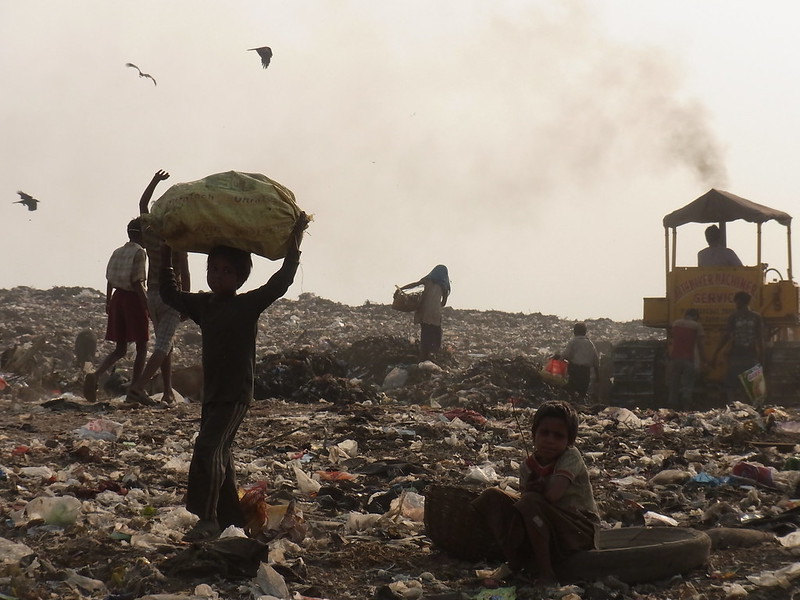Transforming Waste in India Into Sustainable Jobs
 Salma, a home-based waste sorter in the Bengaluru neighborhood of Nayandahalli (India), finds dignity in her profession. “I do it with pride when I pick or sort waste,” she says to an independent researcher, Pinky Chandran. This pride stems from recognizing the value within what society deems as waste. With expertise spanning years, Salma can categorize waste into at least 75 distinct types, showcasing the skill inherent in her profession.
Salma, a home-based waste sorter in the Bengaluru neighborhood of Nayandahalli (India), finds dignity in her profession. “I do it with pride when I pick or sort waste,” she says to an independent researcher, Pinky Chandran. This pride stems from recognizing the value within what society deems as waste. With expertise spanning years, Salma can categorize waste into at least 75 distinct types, showcasing the skill inherent in her profession.
The Importance of Waste-Pickers
People like Salma are the backbone of recycling initiatives in many developing nations, collectively known as the informal recycling sector. These waste pickers and recyclers contribute significantly, representing 1-2% of Asia’s and Latin America’s urban populations. Roughly 20% of the waste produced in India is recycled by an estimated 1.5 to 4 million waste pickers, mostly Adivasis and Dalits. Adivasis are indigenous or tribal peoples of India with distinct cultures and traditions. Dalits are marginalized groups traditionally regarded as “untouchables” within the Indian caste system, facing discrimination and social exclusion.
Despite their indispensable role, waste-pickers endure discrimination, health hazards and economic insecurity. Exposure to hazardous materials daily causes them to face various health risks without health care schemes. Privatizing waste collection further exacerbated their plight, leading to many job losses and income instability. Yet, amid these challenges lies an economic opportunity. The waste management market in India is forecasted to reach $13.62 billion by 2025, with a promising growth rate of 7.17%, which means transforming waste into sustainable jobs has enormous upsides.
Under the prevailing system in India, waste pickers face limited prospects for advancement. However, one social enterprise, “Ashaya,” aims to overturn this reality by prioritizing human development.
Unlocking the Human and Economic Potential of Waste Management
Ashaya’s “Without” project aims to transform trash into long-term jobs. This results from founder Anish Malpani’s commitment to finding sustainable solutions for social, economic and environmental problems. Ashaya has grand hopes rooted in humble beginnings. The enterprise’s mission is to increase the value of “waste.” It is considered a resource by those in the waste-picking business and redistributes that value to stakeholders in the supply chain. By concentrating on the frequently disregarded and neglected waste-pickers and utilizing their potential in conjunction with internal technical advancements, they want to build from the bottom up.
Furthermore, Ashaya’s passion is to bring transformative change. They focus on post-consumer metaled Multi-layered plastic packaging (MLP), such as flexible plastic like candy bar wrappers or chip bags. That is how they created the world’s first pair of sunglasses entirely out of “impossible” to recycle MLP. Ashaya transforms MLP waste into high-quality materials by directly sourcing waste from pickers. For this transformation, they offer a premium incentive for MLP and integrate informal workers into the supply chain.
Most of Ashaya’s employees are former waste-pickers. Waste pickers experience stability and dignity through formal agreements and increased wages. Their incomes rise from 1.2x to 3x compared to the informal sector. Moreover, partnerships with cooperatives ensure that 10% of sales support the education of waste-pickers children, fostering long-term community development.
The Way Forward
As for the future, Ashaya expects sub-district-level decentralized “Material Cradles” to act as long-term recycling hubs. These hubs, supported by centralized research facilities, will drive technological advancements to enhance waste value. Through its “Cradle” programs, Ashaya seeks to offer an alternative to profit-driven enterprises, prioritizing social impact and environmental sustainability as the cornerstones of its vision.
As Ashaya continues its journey, the promise of sustainable livelihoods for waste-pickers heralds a transformative era in India’s waste management landscape by transforming waste into sustainable jobs.
– Spencer Springob
Photo: Flickr
